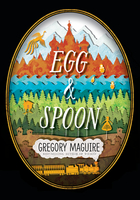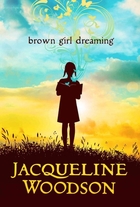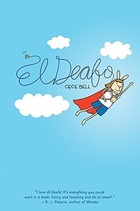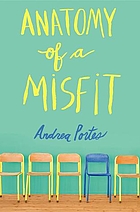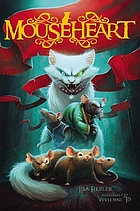I am determined to squeak this post in under the wire, as it were -- the ALA Youth Media Awards will be announced on Monday! Before then, let me briefly sing the praises of some of my favorite picture books of 2014!
The Farmer and the Clown by Marla Frazee -- I'll be honest with you: I didn't want to like this book. The cover is so brown! (I'm predicting that, in a few decades, we'll look back on picture books from the teens and immediately recognize them by the prominence of sepia tones, but that's neither here nor there.) But the book won my heart with the pathos and humor, and the more I look at it, the more convinced I am that it is truly distinguished.
The Right Word: Roget and His Thesaurus by Jen Bryant, illustrated by Melissa Sweet -- These illustrations are so intricate, so eye-catching, and so perfectly attuned to the text and the subject matter of the book! I go back and forth among the titles I'm listing here as to which is my favorite, but I think I land most often on this one.
Sam and Dave Dig A Hole by Mac Barnett, illustrated by Jon Klassen -- This is one of those books that seems simple until you examine it a little more closely. What exactly happens at the end of the book? What does the dog know? These are just a couple of questions that can haunt readers long after the story is over. Creating a picture book with this kind of mystique is quite a feat!
Little Melba and Her Big Trombone by Katheryn Russell-Brown, illustrated by Frank Morrison -- This is just such a happy book. It makes me smile every time I page through it. This has been a particularly good year for picture book biographies, but to my mind, this is definitely one of the best.
Winter Bees & Other Poems of the Cold by Joyce Sidman, illustrated by Rick Allen -- Every page of this book of poetry is a delight to behold. I particularly like the way that the book subtly moves through winter, from the last fall leaves that make an appearance on the first, wordless spread, to the spring buds appearing on the mirroring spread at the end. And did I mention that it's a gorgeous book?
I try to limit myself to five books in these posts, but I'll throw in a few honorable mentions:
Gaston by Kelly DiPucchio, illustrated by Christian Robinson -- Such fun! And of course I'm a sucker for dog stories and funny books, and this is both.
Have You Seen My Dragon? by Steve Light -- This innovative counting book does interesting things with color and perspective.
Bad Bye, Good Bye by Deborah Underwood, illustrated by Jonathan Bean -- Simple and honest, and the artwork really does a great job of amplifying the emotion of the story.
I'll stop there, though it's hard! I mentioned that I don't have a clear favorite, and it's also hard to pick a cutoff point for a list of favorites this year. I'd love to see some of these books scoop up big honors, but I think there are a lot of excellent books out there that I haven't mentioned here. What about you? Any last-minute picks for the Caldecott this year?
Friday, January 30, 2015
Wednesday, January 21, 2015
2014 Chapter Book Roundup
Every year, I like to take a look back at my favorites before the announcement of the ALA Youth Media Awards. Since those are just a little more than a week away (where did January go?), I'd better hop to it! This year I've been having a hard time gathering my thoughts about my favorite books. I've decided I'm not going to even attempt a Young Adult roundup -- my YA reading has just been too scattered, and I haven't been trying to read noteworthy YA books at all. And, while I'll post about some favorite picture books and chapter books, I don't have one standout title in either field. Some years are like that, I guess . . .
So, favorite chapter books:
Greenglass House by Kate Milford (my review) -- This may be my personal favorite of the year. I loved the world-building, the mystery, the characters. Do I really think this will win? Nah, probably not. But it's one I know I will often revisit.
Egg & Spoon by Gregory Maguire (my review) -- Russia! Fairy tales! Feisty heroines! I ate this one up. It's maybe a little ponderous and self-conscious at times, but it's also just so good.
West of the Moon by Margi Preus (my review) -- Another story with fairy tales interwoven and elements of historical fiction, this one also has a really complex and intriguing main character.
Brown Girl Dreaming by Jacqueline Woodson (my review) -- This is the one I think will actually win, and I know a lot of people will be disappointed if it doesn't. Actually, I think this will take an honor, and the medal winner will be something that nobody's talked about very much, probably something that I haven't even read. Guess we'll find out!
El Deafo by Cece Bell (my review) -- So, the last title I mentioned was a verse memoir, and this one is a graphic memoir. It's been an interesting year for the middle-grade memoir. Do I really think this will win? Well, I'm not sure a graphic novel ever can win the Newbery, given the criteria, but if one did, I think this just might be it.
That's where I'll stop with this post. I've read a few others that might be contenders, but I'm just not completely sold on any of them. I really feel like I'm missing something this year. Care to fill in the blanks? What are your picks for this year's Newbery?
So, favorite chapter books:
Greenglass House by Kate Milford (my review) -- This may be my personal favorite of the year. I loved the world-building, the mystery, the characters. Do I really think this will win? Nah, probably not. But it's one I know I will often revisit.
Egg & Spoon by Gregory Maguire (my review) -- Russia! Fairy tales! Feisty heroines! I ate this one up. It's maybe a little ponderous and self-conscious at times, but it's also just so good.
West of the Moon by Margi Preus (my review) -- Another story with fairy tales interwoven and elements of historical fiction, this one also has a really complex and intriguing main character.
Brown Girl Dreaming by Jacqueline Woodson (my review) -- This is the one I think will actually win, and I know a lot of people will be disappointed if it doesn't. Actually, I think this will take an honor, and the medal winner will be something that nobody's talked about very much, probably something that I haven't even read. Guess we'll find out!
El Deafo by Cece Bell (my review) -- So, the last title I mentioned was a verse memoir, and this one is a graphic memoir. It's been an interesting year for the middle-grade memoir. Do I really think this will win? Well, I'm not sure a graphic novel ever can win the Newbery, given the criteria, but if one did, I think this just might be it.
That's where I'll stop with this post. I've read a few others that might be contenders, but I'm just not completely sold on any of them. I really feel like I'm missing something this year. Care to fill in the blanks? What are your picks for this year's Newbery?
Monday, January 19, 2015
Anatomy of a Misfit by Andrea Portes
Anatomy of a Misfit by Andrea Portes is an angsty YA novel set in a Midwestern high school.
Anika Dragomir feels like an outsider in her white-bread high school, despite the fact that she is the third most popular girl in school. Her angst is exacerbated when nerd-turned-hottie Logan McDonough starts giving her rides home from school. Anika kind of likes Logan -- okay, really likes Logan -- but she know that she would get endless flack from Becky, the top most popular girl, if she were to date outsider Logan. Anika's romantic troubles are further complicated when THE Jared Kline, possibly the most popular guy in town, or maybe the state, starts showing an interest in her. Sure, it's flattering, but is he just a scam artist who will use her and drop her as soon as he gets bored? And what about Logan and their sweet, secret romance?
I read this for my book club, and I foresee some interesting discussion ensuing. Anika's narrative voice was, to me, really annoying. I had a hard time liking her, or even relating to her. Despite the title, I didn't see her as a misfit -- in fact, I began to wonder if the title was supposed to refer to her, or to Logan (who probably qualifies as a misfit, but we don't get nearly as much insight into his character as we do into hers). Anika is a pretty, popular girl from a middle-class family. She has 99 problems, and all of them are first-world problems, mostly caused by her own bad choices. Okay, so she's a teenager, I can usually look past that in a YA book. But the writing was not as tight as I would like it to be. For one thing, the book is interspersed with short chapters, set apart by being typeset in italics, that are foreshadowing of the book's final events -- the character is pedaling on a bike, heading toward some cataclysmic event. I'd have been fine with one chapter like that at the beginning, or conversely I'd have been fine if each successive foreshadowing chapter revealed more key details, but they really didn't reveal anything new or add anything to the story. Also, as we might surmise, Anika is the one riding the bike in the foreshadowing chapters, but it's never mentioned in the earlier parts of the story that she even has a bike. Instead, we get her whining about her long walk home from school. Hmm, I see a solution here... One more criticism: I feel like it's just a little bit lazy when authors from my generation write YA novels and set them in the high school of the '80s or '90s, especially when there's not a strong reason within the plot for the book to be set in the present day. Granted, in this case the author mentions that the book is partially based on her own high-school experience, but seeing as it is fiction and not memoir, perhaps the pop culture references and such could have been updated a bit. I can't find a plot-based reason why the characters are name-checking Madonna and Bruce Willis instead of Lady Gaga and Orlando Bloom, or whoever kids these days name-check. Maybe I am being too picky, because the book did grab me once I got past being irritated at the narrative voice and settled into the story. I think this will appeal to fans of YA realistic fiction along the lines of The Perks of Being a Wallflower, but it wasn't really my cup of tea.
(Reviewed from a copy borrowed through my library system.)
Anika Dragomir feels like an outsider in her white-bread high school, despite the fact that she is the third most popular girl in school. Her angst is exacerbated when nerd-turned-hottie Logan McDonough starts giving her rides home from school. Anika kind of likes Logan -- okay, really likes Logan -- but she know that she would get endless flack from Becky, the top most popular girl, if she were to date outsider Logan. Anika's romantic troubles are further complicated when THE Jared Kline, possibly the most popular guy in town, or maybe the state, starts showing an interest in her. Sure, it's flattering, but is he just a scam artist who will use her and drop her as soon as he gets bored? And what about Logan and their sweet, secret romance?
I read this for my book club, and I foresee some interesting discussion ensuing. Anika's narrative voice was, to me, really annoying. I had a hard time liking her, or even relating to her. Despite the title, I didn't see her as a misfit -- in fact, I began to wonder if the title was supposed to refer to her, or to Logan (who probably qualifies as a misfit, but we don't get nearly as much insight into his character as we do into hers). Anika is a pretty, popular girl from a middle-class family. She has 99 problems, and all of them are first-world problems, mostly caused by her own bad choices. Okay, so she's a teenager, I can usually look past that in a YA book. But the writing was not as tight as I would like it to be. For one thing, the book is interspersed with short chapters, set apart by being typeset in italics, that are foreshadowing of the book's final events -- the character is pedaling on a bike, heading toward some cataclysmic event. I'd have been fine with one chapter like that at the beginning, or conversely I'd have been fine if each successive foreshadowing chapter revealed more key details, but they really didn't reveal anything new or add anything to the story. Also, as we might surmise, Anika is the one riding the bike in the foreshadowing chapters, but it's never mentioned in the earlier parts of the story that she even has a bike. Instead, we get her whining about her long walk home from school. Hmm, I see a solution here... One more criticism: I feel like it's just a little bit lazy when authors from my generation write YA novels and set them in the high school of the '80s or '90s, especially when there's not a strong reason within the plot for the book to be set in the present day. Granted, in this case the author mentions that the book is partially based on her own high-school experience, but seeing as it is fiction and not memoir, perhaps the pop culture references and such could have been updated a bit. I can't find a plot-based reason why the characters are name-checking Madonna and Bruce Willis instead of Lady Gaga and Orlando Bloom, or whoever kids these days name-check. Maybe I am being too picky, because the book did grab me once I got past being irritated at the narrative voice and settled into the story. I think this will appeal to fans of YA realistic fiction along the lines of The Perks of Being a Wallflower, but it wasn't really my cup of tea.
(Reviewed from a copy borrowed through my library system.)
Sunday, January 18, 2015
Rain Reign by Ann Martin
Rain Reign by Ann M. Martin is an emotionally evocative book about a girl and her dog.
Rose, a high-functioning autistic 12-year-old, loves homonyms and prime numbers, her Uncle Weldon, and her dog Rain. Her father is often harsh, her mother is gone, and her classmates are not particularly friendly, so Rose treasures the few bright spots in her life. When her father lets Rain out without her collar in the aftermath of a hurricane, Rain is lost, but Rose soon makes a plan to find Rain again. Will she succeed?
I like to shoot straight with people in my reviews of dog books, so I will tell you this: the dog does not die, but this book will still make you cry. Martin does a good job of capturing the relationship between Rose and Rain without descending into sappiness. My only criticism of the book is that the ending felt rushed to me -- certain things happened and were never explained fully. On the other hand, that's quite similar to real life, especially for kids in situations similar to Rose's, so perhaps I shouldn't complain. I would recommend this book to readers who like stories featuring animals and don't mind a little sadness along the way.
(Reviewed from a copy borrowed through my library system.)
Rose, a high-functioning autistic 12-year-old, loves homonyms and prime numbers, her Uncle Weldon, and her dog Rain. Her father is often harsh, her mother is gone, and her classmates are not particularly friendly, so Rose treasures the few bright spots in her life. When her father lets Rain out without her collar in the aftermath of a hurricane, Rain is lost, but Rose soon makes a plan to find Rain again. Will she succeed?
I like to shoot straight with people in my reviews of dog books, so I will tell you this: the dog does not die, but this book will still make you cry. Martin does a good job of capturing the relationship between Rose and Rain without descending into sappiness. My only criticism of the book is that the ending felt rushed to me -- certain things happened and were never explained fully. On the other hand, that's quite similar to real life, especially for kids in situations similar to Rose's, so perhaps I shouldn't complain. I would recommend this book to readers who like stories featuring animals and don't mind a little sadness along the way.
(Reviewed from a copy borrowed through my library system.)
Saturday, January 17, 2015
Spirit's Key by Edith Cohn
Spirit's Key by Edith Cohn is a paranormal adventure for the middle-grade set.
Spirit's father has the family gift: when he holds someone's house key, he can tell them what might happen in their future. But lately he's been having more and more trouble getting good readings. Spirit, meanwhile, is preoccupied in her own grief: her dog Sky died mysteriously, and since he was one of the island's despised wild dogs that Spirit had domesticated, she gets little sympathy from the locals. When other wild dogs start dying, Spirit begins to suspect that someone is killing them -- but when a few village residents become ill, the local prejudice threatens to overwhelm the situation. Spirit, with the help of a new human friend and the ghost of her beloved dog, must find some way to save the wild dogs and the island's residents from impending disaster -- all while coping with her own budding paranormal gift.
There's a lot going on in this story, but it all comes together well. I didn't feel like the mystery element was particularly strong, but then again, the story is trying to do more than just be a mystery, what with the paranormal elements and the dogs and all. I found it a little lacking, but I may just not have been in the mood for this kind of story.
(Reviewed from a copy borrowed through my library system.)
Spirit's father has the family gift: when he holds someone's house key, he can tell them what might happen in their future. But lately he's been having more and more trouble getting good readings. Spirit, meanwhile, is preoccupied in her own grief: her dog Sky died mysteriously, and since he was one of the island's despised wild dogs that Spirit had domesticated, she gets little sympathy from the locals. When other wild dogs start dying, Spirit begins to suspect that someone is killing them -- but when a few village residents become ill, the local prejudice threatens to overwhelm the situation. Spirit, with the help of a new human friend and the ghost of her beloved dog, must find some way to save the wild dogs and the island's residents from impending disaster -- all while coping with her own budding paranormal gift.
There's a lot going on in this story, but it all comes together well. I didn't feel like the mystery element was particularly strong, but then again, the story is trying to do more than just be a mystery, what with the paranormal elements and the dogs and all. I found it a little lacking, but I may just not have been in the mood for this kind of story.
(Reviewed from a copy borrowed through my library system.)
Friday, January 16, 2015
Bomb by Steven Sheinkin
Bomb: The Race to Build -- and Steal -- the World's Most Dangerous Weapon by Steve Sheinkin is juvenile nonfiction at its absolute best.
During World War II, one of the most decisive battles was fought, not on a battlefield, but in a laboratory. The race to build the atomic bomb was on, and pretty much all of the world's top physicists were working on the problem in one way or another, for one major power or another. In Los Alamos, New Mexico, scientists from the Manhattan Project, headed up by Robert Oppenheimer, worked tirelessly to build and test the American bomb -- but a few of them were also leaking secrets to the Soviet Union. Meanwhile, American spies worked hard to sabotage Germany's nuclear efforts, despite not knowing exactly what German scientists knew, or even where they were.
This is an amazingly gripping and readable work of nonfiction. The pacing is excellent as the author switches from one story to another, and he does a great job of making the historical figures come alive without sacrificing historical accuracy. And his brief summation of the Cold War and the development of more powerful weapons at the end of the book is quite chilling. I listened to the audiobook and found myself completely captivated by it. I'd recommend this title for its intended audience (ages 9-14), but also for adults like myself, with an interest but not a lot of knowledge on the topic of the Manhattan Project and the creation of the first nuclear weapons.
(Reviewed from an audiobook borrowed through my library system.)
Thursday, January 15, 2015
Mouseheart by Lisa Fiedler
Mouseheart by Lisa Fiedler is a juvenile adventure story featuring mice and rats.
Hopper's life started in a Brooklyn pet store, and it looks like it's going to end there. When Hopper and his siblings overhear that the pet store owner is about to sell them as snake food, they know they must do something drastic right away. The ensuing escape results in Hopper and his siblings being split up. Hopper finds himself in the sewers, where he meets up with a friendly, streetwise young rat named Zucker, who also happens to be the prince of the underground rat kingdom of Atlantia. This kingdom seems like a paradise to Hopper, especially since, as a friend of the prince, he is given a lavish royal welcome. However, all is not as it seems in the kingdom, and revolutionaries threaten to bring it down from the outside. All Hopper wants to do is to be reunited with his lost siblings -- but does he have a larger role to play?
This animal fantasy was, for me, just an okay read. I thought it was a little predictable, and Hopper's extreme naivete, though believable, was irritating to me. I'll recommend this to kids who can't get enough of this sort of story, but everyone else can probably pass on this one.
(Reviewed from an advance copy, courtesy of the publisher.)
Hopper's life started in a Brooklyn pet store, and it looks like it's going to end there. When Hopper and his siblings overhear that the pet store owner is about to sell them as snake food, they know they must do something drastic right away. The ensuing escape results in Hopper and his siblings being split up. Hopper finds himself in the sewers, where he meets up with a friendly, streetwise young rat named Zucker, who also happens to be the prince of the underground rat kingdom of Atlantia. This kingdom seems like a paradise to Hopper, especially since, as a friend of the prince, he is given a lavish royal welcome. However, all is not as it seems in the kingdom, and revolutionaries threaten to bring it down from the outside. All Hopper wants to do is to be reunited with his lost siblings -- but does he have a larger role to play?
This animal fantasy was, for me, just an okay read. I thought it was a little predictable, and Hopper's extreme naivete, though believable, was irritating to me. I'll recommend this to kids who can't get enough of this sort of story, but everyone else can probably pass on this one.
(Reviewed from an advance copy, courtesy of the publisher.)
Subscribe to:
Comments (Atom)






